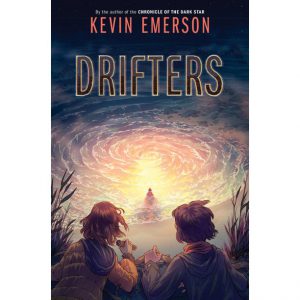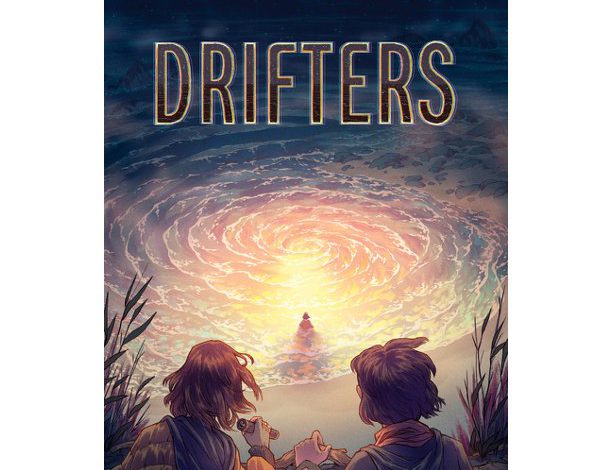 In his novel Drifters, Kevin Emerson explores what it feels like to be adrift, to not fit in or to feel empty and alone. Where Micah Rogers blooms in a group of people, Jovie Williams withers. Now, Micah has disappeared, and Jovie feels untethered. Her missing friend leaves a hole in the world and a hollow feeling inside Jovie.
In his novel Drifters, Kevin Emerson explores what it feels like to be adrift, to not fit in or to feel empty and alone. Where Micah Rogers blooms in a group of people, Jovie Williams withers. Now, Micah has disappeared, and Jovie feels untethered. Her missing friend leaves a hole in the world and a hollow feeling inside Jovie.
Although other people are able to “move on” with their lives, Jovie is obsessed with finding her friend. When she discovers evidence that suggests Micah may have found a way to cross into an alternate universe, she is determined to bring her back. Jovie secures the help of ten-year-old genius Sylvan Reynolds, and together the two perform detective work.
When the pair notices that people in Far Haven are losing their memories and suffering from peculiar medical conditions, their focus turns to the Baxter Nuclear Plant accident in 2010 and the arrival of Barsuda Solutions. The cleanup workers, who never left and who move about mysteriously, might be more than what they claim. When someone secretly leaves a spy glass in Jovie’s backpack with instructions to “look at what is lost” (84), Jovie realizes that the device enables her to see the essence of a person who is otherwise invisible.
As the plot thickens, Sylvan and Jovie develop and discard various theories about what is happening in their Western Washington town, where the universe might be unraveling and an alien culture might be trying to breach the boundaries of Earth.
With his time-bending tale featuring cosmic rays, conspiracy theorists, and other worldly gateways, Emerson explores some very real feelings about loneliness and being left out. Many readers will connect to Carina’s description of feeling frayed and unwanted. If we spend enough time with a lack of warmth and amid forces that try to pull us apart, our human desire for something more welcoming may draw us to believe in a place where we are wanted—call it heaven, Nirvana, Elysia, or the great beyond. Our search for belonging may force us to turn all of our energies into seeking refuge by means that others may consider unrelatable or unreasonable. Jovie is fortunate in that Dr. Wells tells her: “You would have been my hero when I was your age. I know what it’s like to believe so strongly in something that no one else sees” (370). Some of us may not have that kind of messaging to encourage us.
Readers will derive additional morals, realizing that the best way to make something go away is to talk about it, explore it, and find a resolution. Ignoring or attempting to bury hurt only causes it to fester.
Another comes in Emerson’s message that lies can shape us just as easily as truth. Although someone may believe that hiding the truth is a form of kindness or of protecting people, deception takes away a person’s’ ability to choose. Just as the people in Far Haven live in the shadows of nuclear towers and are led to believe that they and their town aren’t important enough to be protected, to be valued, a person can develop an attitude that shapes every thought: Why try harder, work harder, take a risk, even keep your business open, if this is only Far Haven (432)? By revealing the effects of lying, Emerson seems to suggest that we should trust others with the truth.
- Posted by Donna

